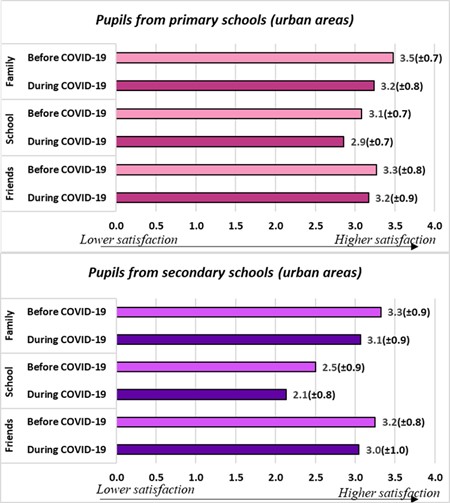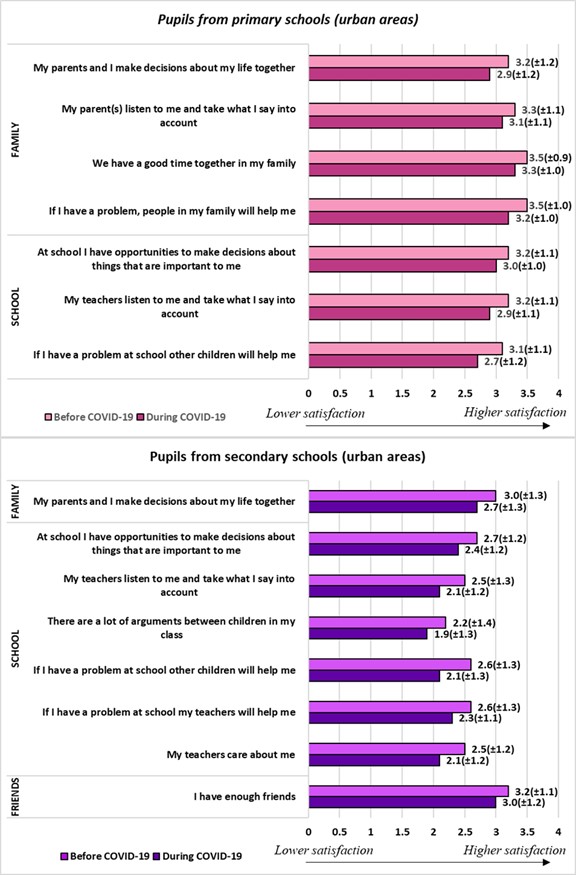This blog post is the second part of a series presenting preliminary findings on children’s well-being in Wales before and during the Covid-19 pandemic. It uses data from the International Survey of Children’s Well-Being (ISCWeB) – Children’s Worlds, a worldwide survey on children’s subjective well-being, with this wave comprising 20 countries in total. The survey was undertaken in Wales in 2018 and 2021, involving pupils from primary (9-11 years old) and secondary (12-14 years old) schools around Wales.
The findings presented here show that Welsh children were less satisfied with school during the pandemic than before it. Interestingly, these findings suggest this isn’t simply due to a lack of contact with their classmates, as many media outlets have reported. Rather, the results suggest that a lack of opportunities to make decisions both within their family life and at school, resulted in a perceived lack of control and the perception of not being listened to.
What did we do?
We assessed children’s satisfaction with three aspects of their lives (family, school and friends) in pupils from primary and secondary school sectors in urban areas before and during the Covid-19 pandemic. Preliminary analysis had revealed a statistically significant difference in all three aspects for them but not for pupils from rural areas.
As with the first blog post of this series, there are caveats. Firstly, because this is a cross-sectional study, it does not follow the same pupils across time, but rather two distinct cohorts. Secondly, even though the survey was sent to the same schools in both waves, only a few schools participated in both. Finally, due to the limits of the coronavirus pandemic (eg, internet access), the sample size in the second wave is smaller than in the first.
What did we find?
Unsurprisingly, there was a decrease in children’s satisfaction with all three aspects of their lives (family, school and friends). Among the younger children, the smallest decrease was seen in their satisfaction with friends, followed by their satisfaction with family, and lastly, with school life. For the older children, satisfaction with both their family and friends decreased at a similar rate, with the greatest decrease being observed in their satisfaction with school life (Figure 1).
In the case of satisfaction with school, there was already a gap between the two age groups, with older children showing less satisfaction with school life. The trend continued into the pandemic, though both age groups register a decrease (Figure 1).

Figure 1 – Children’s satisfaction with their family, friends and school life – average (SD): before and during the coronavirus pandemic
The factors behind these decreases can be better understood when considering the individual questions asked in relation to the three topics of interest (Figure 2)[1]. In the case of family, an important decrease could be seen in relation to making decisions about their life with their parents, regardless of age. Younger children appeared to be less satisfied than their older peers in terms of the help they received from family members if they had a problem (see Figure 2).
When it comes to satisfaction with their friends, this was the aspect that showed the least volatility, reflecting that online contact was rather successful in replicating their pre-pandemic social interactions. Children were able to maintain contact with friends and appeared to be less isolated than has been reported in the media. However, pupils from secondary schools did show some decline in satisfaction in terms of having enough friends[2] (Figure 2).
Notably, our findings revealed that the lockdown limited their opportunities to make decisions about their lives, rather than isolating them from their peers.

Figure 2 – Children’s satisfaction with their families, friends, and school life before and during the Covid-19 pandemic – average (SD) – (individual questions)
Finally, with regard to school satisfaction, both age groups show a decline. They felt less listened to by their teacher and less helped by their classmates, regardless of age, with older children feeling less cared for by their teachers (Figure 2). This emphasises how remote learning and teaching made pupils feel less in control of their learning experience, diminishing their satisfaction with it even further. Indeed, the transition to online technology was sudden and provided little time for both pupils and teachers to adjust, and these results highlighted the extent of the disruption it caused.
Overall, aspects related to school appeared to be the main source of concern, as it is the one area that registered a considerable decrease during the Covid-19 pandemic compared to the period before it. Furthermore, it was the only element that differed considerably between younger and older children, with the latter being much less satisfied. This aligns with the latest findings from The Children’s Society report which also reported a decrease in pupils’ happiness with school, highlighting it as an area for closer attention.
Finally, regardless of age, there was a significant drop in satisfaction with regard to pupils’ opportunities to make decisions both within their family life and at school, again aligning with findings from The Children’s Society report, which also found that children were less happy with how much they are listened to.
What else do we plan to do?
As data for all countries that took part in the survey is now available, the next phase in the research will be to see how Wales compared to the other European countries that took part in the study.
[1] The focus was on questions where the decrease was equal to or greater than the overall average decrease for all three aspects for each of the age groups.
[2] When tested for statistical significance (t-test, differences in satisfaction with friends were significant only for pupils in secondary school.
Disclaimer
The data used in this publication come from the Children’s Worlds Covid-19 Supplement project: An international survey of children’s lives and well-being (www.isciweb.org). The views expressed here are those of the author. They are not necessarily those of ISCWeB.
Image credit: Photo by Ralston Smith on Unsplash.

